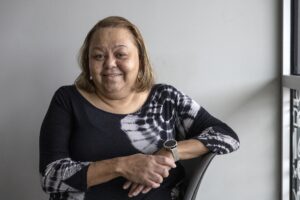Medicaid. SNAP. Housing assistance. School meal programs. Child care assistance. Employment and transit services. Head Start. Health and unemployment insurance. The list goes on and on for programs and services that receive federal funding based off of census data. For Minnesota, it’s estimated that the state will lose $28,000 per person over a decade for not counting just one person. So, it’s no surprise that oftentimes it’s the historically undercounted communities that have been historically under-resourced as well.
The census is much more than just a count of who lives here. In addition to it serving as a significant determinant of the allocation of resources to our communities, it also impacts local, state, and national political representation. For this census coming up next year, Minnesota is at risk of losing a congressional seat. And—following the 2010 census results, North Minneapolis actually lost a councilmember. Though the population might actually stay the same (or even increase!), the impacts of not being counted have significant repercussions.
So, what all does this have to do with us? Everything. When resources are underestimated and communities are underrepresented, the opportunity to flourish and thrive diminishes. As an agency who has deep roots in these undercounted communities in Minneapolis—immigrants and refugees, those experiencing homelessness, indigenous communities, low-income households, renters, and more—we have a natural role and responsibility in taking part in census efforts to ensure a complete and accurate count.
We launched our efforts by hosting a census hiring fair at Brian Coyle Center in Cedar Riverside, with hopes to recruit census staff who represent the very communities they have a hard time reaching. As a registered Complete Count Committee with the Census Bureau, we plan to continue our efforts by engaging in culturally relevant outreach and engagement via our direct service programs, community events and info sessions, awareness through our media outlets North News and KRSM Radio, door-knocking, and more. With this being the first census where online participation is encouraged, we also plan to host open computer lab times to assist community members with this task, recognizing the very real digital divide in our community when it comes to technology access and literacy. Not only that, but with the census collecting responses in only 13 languages (none of which are Somali or Oromo), it’s imperative that our staff, who collectively speak 19 languages, are equipped to assist in these efforts.
Lastly, engaging with our communities to help participate and take leadership roles in these outreach efforts will be key. We want to provide the tools and support needed for folks to be part of the systems and solutions that impact their lives, recognizing it’s important that those who are doing much of the outreach reflect the communities they’re trying to reach. Especially with fear of government entities so prevalent, it’s trust and connection that will effectively get the message across.
Ultimately, the Census means more resources coming into our communities and fair representation, political power. But it also just means – you exist. We exist. We count. We are here and this is our home.
Want to volunteer or partner with us in our census efforts? Contact Meghan: [email protected], 612-455-0388.



